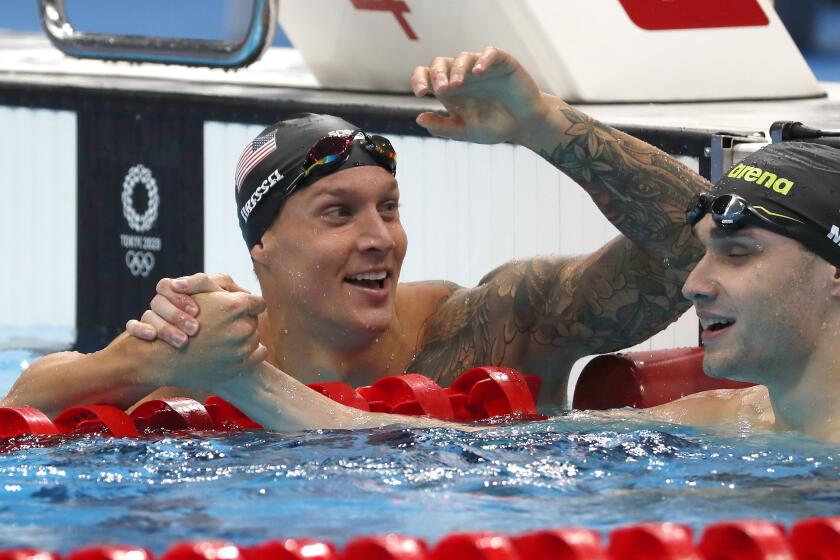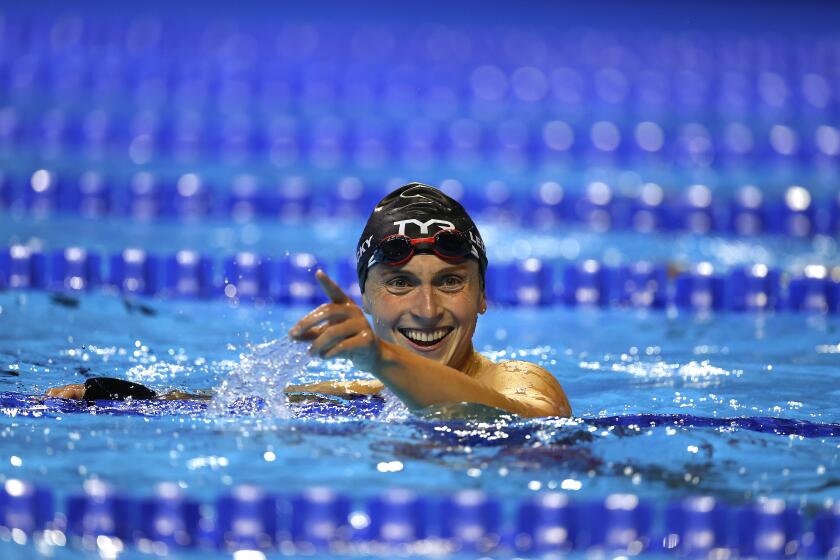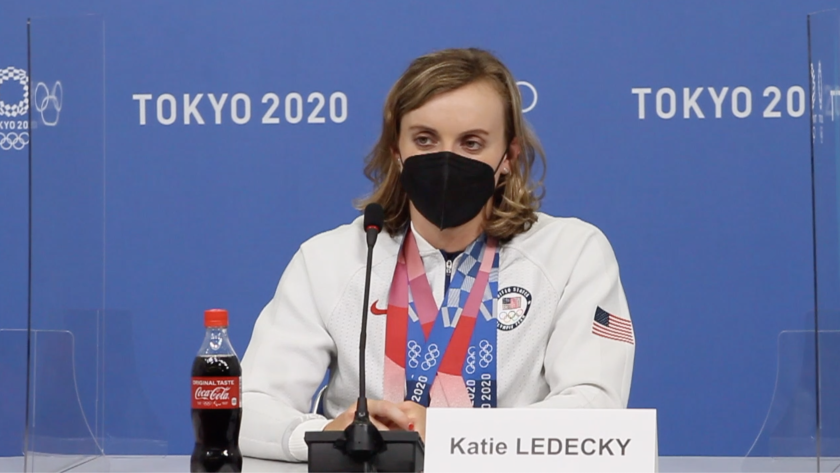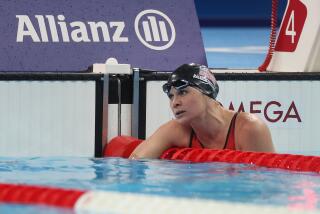Katie Ledecky made history look routine in adding to record Olympic medal haul
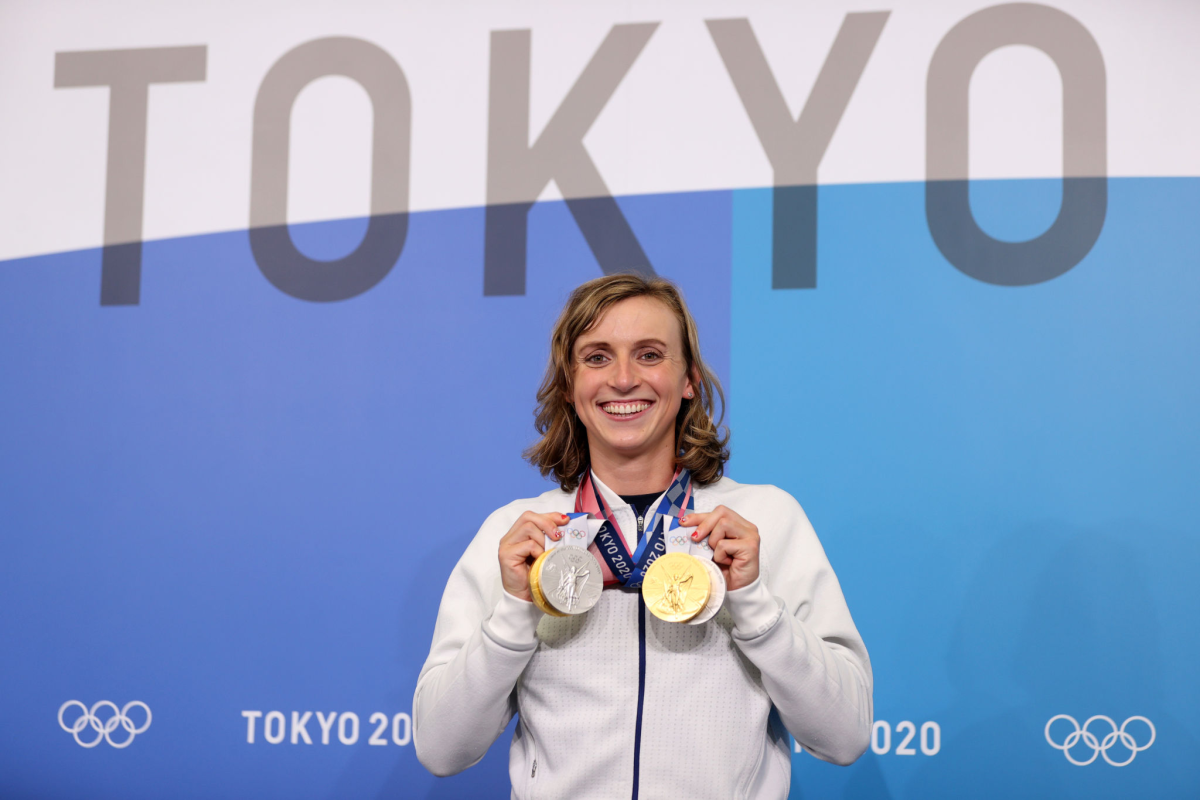
- Share via
TOKYO — On the ninth day of the swimming competition at the Summer Games, Katie Ledecky rested.
The 24-year-old spent a grueling week making history at the Tokyo Aquatics Centre, though her low-key words, as usual, didn’t suggest anything so brash.
“I’m just going to try and live in the moment right now,” Ledecky said, planning to spend the final session at the pool cheering teammates from the stands. “I think I’ve done a good job of that this week in taking it one day at a time, one race at a time. I don’t think any of us like to look at our careers as whole and take too much time to settle. I think I’ve always been just moving forward, driving forward and always looking towards the next goal.”
Caeleb Dressel reconfirms his stardom with a world record in the 100 butterfly and Katie Ledecky wins gold in the 800 freestyle at the Tokyo Olympics.
During a record-shattering career where the remarkable has somehow become routine, she once again pulled the sport into unfamiliar waters.
Over parts of seven days, Ledecky swam 10 races totaling 6,200 meters across five events. No one had attempted such an ambitious program at an Olympics. The Ledecky-an effort might not have had the glitz of Michael Phelps winning eight gold medals at the Beijing Olympics in 2008 or Ledecky smashing two world records five years ago at the Rio de Janeiro Games, but demonstrated the extraordinary level of performance she has normalized.
Ledecky collected gold medals in the 1,500-meter freestyle — the first time women have contested the event at the Olympics — and the 800 freestyle for the third consecutive Games in the capstone to the week Saturday. She added a pair of silver medals.
The victories gave Ledecky six individual gold medals in her career, the most of any female swimmer in history.
Matt Barbini, USA Swimming’s national team performance director, called the program “astronomically difficult.”
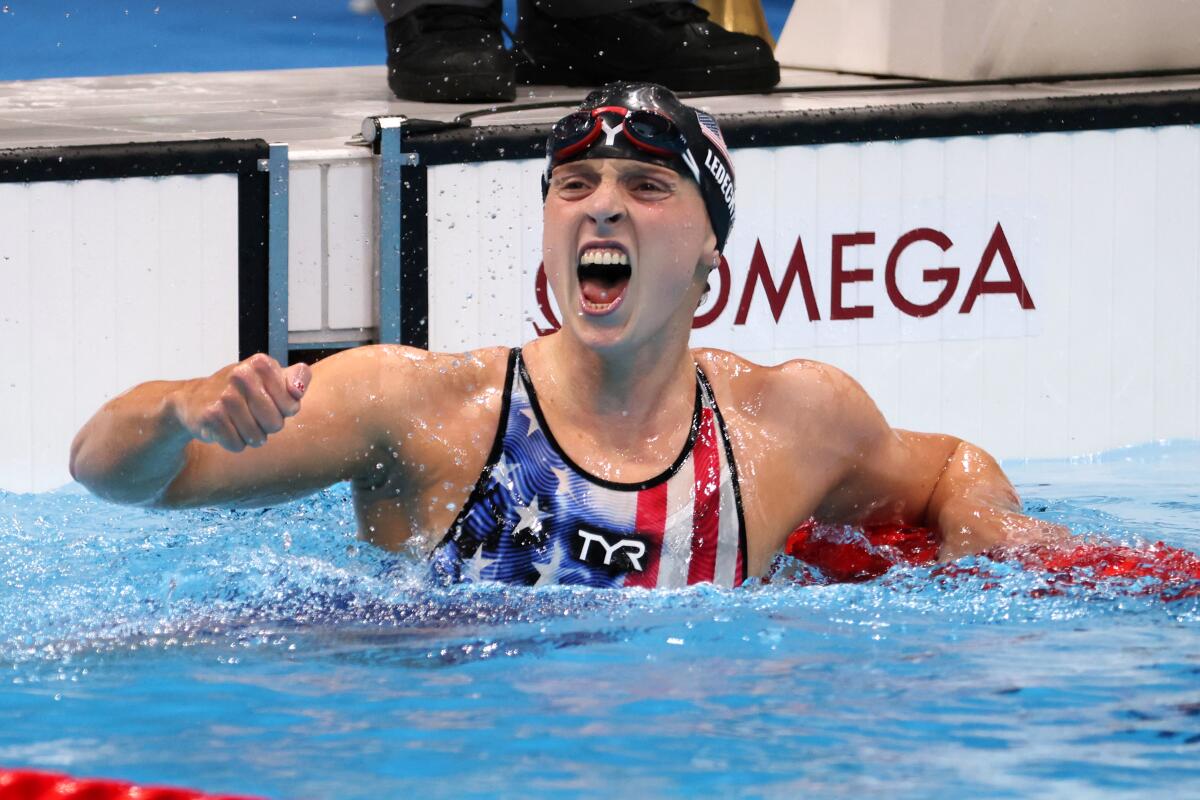
“I still love this sport. I love it more and more every year. I feel I’m going to give every ounce I have to this sport.”
— Katie Ledecky
“It may be a while, if ever, before you see someone do it again,” Barbini said Saturday. “You get used to Katie being so dominant that it seems sort of commonplace and it’s surprising when she doesn’t win. … [The slate of events] takes a huge toll physically, but it also takes a huge toll mentally and emotionally to go through that type of racing with different pressures on you and the level of competition that you’re facing when there really is no room for error in most of those events anymore.”
Unlike in Rio, where Ledecky cruised to wins with head-shaking margins, Australian sensation Ariarne Titmus provided a worthy competitor this time. The 20-year-old edged Ledecky in a neck-and-neck 400 freestyle to start the week, though even in losing — if you can call it that — Ledecky clocked the second-best time of her career. It was less than a second shy of the world record she set in Rio.
Katie Ledecky’s seemingly effortless excellence leaves some of the most experienced people in swimming grasping for the secret to her dominance
Titmus also won the 200 freestyle — Ledecky fell to fifth place — and hung with her in the 800 freestyle to finish second, 1.26 seconds behind the American. That was well short of Ledecky’s headline-grabbing 11-second margin of victory in Rio. The ripples of surprise that someone kept pace in her trademark event showed both the growth of the sport and the expectation that stalks every race. Ledecky, after all, hasn’t lost an 800 freestyle since 2010 and owns the top 24 times in history.
“She has been so good for so long, that she’s become underrated and underappreciated,” Barbini said before the Games. “We take it for granted. And I think we hold her to a totally unfair standard. So if she doesn’t do something just mind blowing, there’s sometimes this chorus of, ‘What’s wrong with Katie?’ Nothing’s wrong. She won the race.”
- Share via
U.S. swimmer Katie Ledecky, who won two gold medals and two silvers at the Tokyo Olympics, intends to compete at the 2024 Paris Games.
Russell Mark, the rocket scientist turned national team performance manager for USA Swimming, last month compared Ledecky’s astonishing consistency to Angels center fielder Mike Trout. The nine-time All-Star produces historic seasons with such regularity that the performances become more expected than jaw-dropping, fading into a chorus of, “OK, just another amazing year.”
“She’s been lengths ahead of everybody by massive, massive amounts and I do think that gets taken for granted,” Mark said. “It’s an all-time greatness that we get to see and I think people just get accustomed to it.”
True Sweetser, who trained with Ledecky at Stanford, put it a different way: “It’s like having a house in the Hollywood Hills. You get used to the views. You can get inured to anything. She’s been able to shift the framework of what female distance swimming is.”
Ledecky has swum punishing programs before at the world championships. But everything about the Olympics is different, including morning finals sessions in Tokyo to accommodate prime-time television audiences in the U.S. The absence of fans — only athletes, coaches, officials and media were allowed in the building — added another wrinkle.
She swam the 6,200 meters — plus countless laps warming up and warming down — in a little less than 135 hours. The only competitor, male or female, who came close to that distance was Austria’s Felix Auboeck at 5,400 meters. The distance came with a cost.
“It was pretty hard,” Ledecky said. “Each race had its own challenges and just managing the workload ... each prelims race felt good and easy, but then it would kind of catch up with you. You just are trying to get as much sleep as you can.”
But Ledecky has the uncanny gift to thrive not just in distance races, but to do the same in frantic sprints. Anchoring the U.S. 4x200 freestyle relay, she zoomed to a split of 1 minute, 53.76 seconds to help the team win a silver medal. No other swimmer in the event had a faster split.
Ledecky will return for the Paris Games in three years and left open the possibility of swimming in Los Angeles in 2028.
“I still love this sport,” she said. “I love it more and more every year. I feel I’m going to give every ounce I have to this sport.”
For now, though, she’s ready for a break after the most demanding week in Olympic history.
“Katie had absolutely nothing to prove coming into this,” Barbini said. “And she has proved some more.”
More to Read
Go beyond the scoreboard
Get the latest on L.A.'s teams in the daily Sports Report newsletter.
You may occasionally receive promotional content from the Los Angeles Times.
